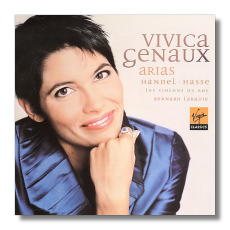
The Internet's Premier Classical Music Source
Related Links
- Latest Reviews
- More Reviews
-
By Composer
-
Collections
DVD & Blu-ray
Books
Concert Reviews
Articles/Interviews
Software
Audio
Search Amazon
Recommended Links
Site News
 CD Review
CD Review
Vivica Genaux

Arias
- George Frideric Handel:
- Arias from Orlando (2) and Alcina
- Cantata, Splenda l'alba in oriente, HWV 166
- Arias from Arminio (3)
- Johann Adolf Hasse:
- Cantata, La scusa
Vivica Genaux, mezzo-soprano
Les Violons du Roy/Bernard Labadie
Virgin Classics 545737-2 DDD 72:03
The music on this CD originally was performed by castratos, so an "authentic performance" is impossible, except under extraordinary circumstances. Today, one can perform such repertoire in two different ways. One would be to assign it to biologically intact males – Baroque specialists, certainly – comfortable with the music's range. Visually and dramatically, this has validity: a man can sing a man's roles. The disadvantage is that many modern listeners are uncomfortable with the voices of these singers, and find such singing "unmanly," whatever that means. The alternative is to assign this repertoire to women. This is a blow to dramatic verisimilitude, no matter how clever the costume designer and the makeup artists are. On the other hand, more conservative listeners are comfortable with the sounds that these women make; they don't threaten the listener's masculinity, perhaps!
Vivica Genaux, a native of Alaska, makes a handsome hero, but there's no disputing that she's also an attractive woman. She is a specialist in the Baroque and bel canto repertoires… and yes, sometimes she even gets to play the role of a woman. (Her Barbiere di Siviglia Rosina is one of her calling-card roles.) After receiving her undergraduate degree from Indiana University, she studied with Claudia Pinza, the daughter of the late basso Ezio Pinza.
Genaux first came to my attention in 2005 with her wonderful recording of Vivaldi's opera Bajazet (also on Virgin Classics). The set also came with a DVD of the principal singers, including Genaux, shown recording one or two of their arias from that opera. I was impressed with Genaux's agility and musicality. She can spit out what seems like 100 notes a second, but with no loss in tone quality or expression. She makes it look so easy!
The CD reviewed here presents different challenges. Hasse (active in Dresden) and Handel (the adopted Englishman) were arguably less sadistic than Vivaldi in their treatment of the human voice. (Vivaldi seemed to regard it as just another violin!) That's not to say that virtuosity is not required here, but the bravado level is lower, and the need for subtlety and differentiation greater.
Genaux's voice is fabulous. It is evenly produced throughout its range, and it never loses its character. Some listeners will be reminded of a young Marilyn Horne as they hear Genaux's singing. Both have imposing voices, yet the sound is never thick, "butch," or ungainly. One area in which Horne surpasses Genaux, however, is in characterization. Genaux's recording of "Bel Canto Arias" (on Virgin Classics as well) was impressively sung, but not as exciting as it could have been, because the mezzo didn't make the characters come alive. Her Rossini Cenerentola was too similar to her Donizetti Orsini (Lucrezia Borgia), and so on. Similar concerns arise here. One could argue that Handel's and Hasse's heroines… oops, heroes… are stock figures anyway, and that it is less important to act with the voice in the Baroque repertoire than in bel canto. I disagree. Given time, I think Genaux's interpretations will take on more light and shade. For the time being, we can enjoy the sound of the voice itself, and the technical skill with which Genaux uses it.
There is good support from Labadie and Les Violons du Roy (formerly Dorian recording artists), and Virgin's booklet contains texts and translations.
Copyright © 2007, Raymond Tuttle




















